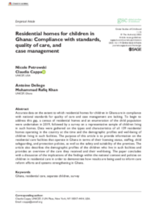Displaying 1931 - 1940 of 14580
This briefing paper focuses on responses in the European Union (EU) to the arrival of unaccompanied children fleeing from Ukraine.
This study aimed to use longitudinal data pertaining to children who had been adopted from care to examine the relationship between being adopted from care and psychological trauma.
Hundreds of lone child refugees have been housed in Home Office hotel accommodation branded “unacceptable” by Ofsted despite ministers pledging to end the practice last year, it has emerged.
The rates of Indigenous people being jailed, dying by suicide, and having their children placed in out-of-home care are continuing to worsen for the second year in a row.
In North Carolina, parental substance use has become the leading reason children enter the foster care system. The state Department of Health and Human Services (DHHS) reports that of 15,239 children in foster care in 2021, 41 percent were removed from their homes because of drug use. That’s up from less than 29 percent in 2012.
The purpose of this article is to provide information on the residential care facilities that operate in Ghana in terms of their licensing status, staffing, child safeguarding, and protection policies, as well as the safety and suitability of the premises. The article also describes the demographic profiles of the children who live in such facilities and provides an overview of the care they received and their well-being.
There is limited evidence on family reintegration for children who have been in residential care within the African context. The goal of this study is to find out what factors impact reintegrated institutionalized children’s desire to remain with their biological parents or extended family.
The Children in Adversity Senior Technical Advisor will be a member of this team based in Washington, DC. This is a long-term position with an immediate start date. The Children in Adversity Senior Technical Advisor will work across a broad range of technical functions. The Technical Advisor will lead on activities related to Objective 2 of APCCA and will guide programming to support those most vulnerable children who are, or are at risk of, living outside of family care by promoting, funding, and supporting nurturing, loving, protective, and permanent family care.
Social protection is increasingly being used in Eastern and Southern Africa to address economic and social vulnerability. Many governments in the region are also engaged in care reform to prevent family separation, support families to care for children well and provide quality alternative care. The same frontline workers are also often engaged in these two streams of work. This paper provides an outline of the key concepts and processes involved in social protection system strengthening and care reform and makes an argument for encouraging greater synergies between these two systems.
In the brochure, you will find the basic rules of safety, hygiene, nutrition, vaccination, psychological support - the answers to the questions that are currently most relevant are collected in one material prepared by UNICEF with the support of the United States Agency for International Development (USAID).






